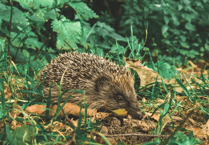We often discuss the merits of microchipping in these articles, and the last few days have highlighted just how important up-to-date chips can be - with a sad story about a dog, and a happy one about a cat.
The cat is called Orry and he came to our attention because he moved in with a feral cat colony at a farm in Kirk Michael several months ago.
The lady who keeps an eye on the feral colony thought the new cat seemed surprisingly friendly, and so she brought him to us for a chip check.
Sure enough, he was chipped and we were able to contact his owner.
His Peel-based owner was incredulous to begin with because Orry disappeared six years ago, along with another cat.
We will probably never find out how the cats disappeared - they may have jumped into a vehicle and been transported accidentally to a new location or, sadly, deliberately ’cat-napped’ as a prank.
Orry has now returned to family life, and his owner says that ’he’s settled in fine, and is doing well’.
One wonders how many of his nine lives he’s used up in the last six years, and whether he was still trying to make his way home from Andreas to Peel when he was found in Kirk Michael. If only he could talk, but at least his microchip has given us sufficient information for there to be a happy ending.
Which is more than can be said for a dog who was found dead on Jurby beach last week.
We retrieved the body, which didn’t appear to have been in water for very long, and checked it straight away for a microchip.
Our scanner found a chip, but it isn’t registered in anyone’s name.
Nor is the chip number one that we can trace to a particular microchip company, or to a specific location or country.
We posted details about the dog, a female British Bulldog, on our social media platforms in the hope that an owner would come forward, but with no success.
However, a Braddan company called the Pet Genetics Lab (https://www.petgeneticslab.co.uk/) saw our appeal and have offered their assistance.
They will test the dog’s DNA to determine her genetic fingerprint.
It’s unlikely that they will find a match with any DNA details already held on their database, but it may help if a sibling or parent is able to be tested at some point in the future. Alongside using DNA to establish a dog’s identity, the Pet Genetics Lab also tests for known inherited diseases to help owners who wish to breed to check the health of their dogs, encouraging responsible breeding; and they also help owners who have a dog who may have a genetic disorder that blood tests alone cannot identify.
So the mystery surrounding our British Bulldog remains.
Was she being transported in a boat to or from Ireland to the UK, and was she washed overboard? She may have been a breeding bitch, and part of a lucrative breeding industry, which is why her owner(s) haven’t come forward.
Bulldog puppies were being sold for a staggering £10,000 each at the height of the pandemic, and it’s easy to see why a ’black market’ for the popular breeds exists.
All the more reason to make sure you buy a puppy from a registered breeder.
We will keep searching for an owner, in the hope that the dog was a much-loved family pet, so that they have some ’closure’ and certainty over a missing animal.
This would be made much simpler, of course, if the microchip had been registered and the details kept up-to-date.





Comments
This article has no comments yet. Be the first to leave a comment.